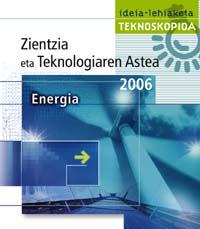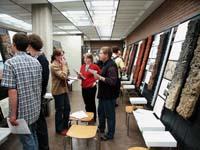To the square of science and technology!
2006/11/01 Galarraga Aiestaran, Ana - Elhuyar Zientzia Iturria: Elhuyar aldizkaria

The first Science Week was organized in 2000 on the initiative of the European Union. The promoters had a clear objective: to bring science and technology closer to the public. They maintain the same objective, having clear that it is essential to act as a lever if you want to influence society. And it is not useless work, because it benefits the whole society.
Thus, a network of promoters has been created in the European Union and in other countries to organize attractive and significant events for several days, focused on science and technology.
In the CAPV the Saretak organization is in charge of organizing the Science Week. Saretek is the Basque Network of Science, Technology and Innovation, which brings together all the agents involved in the field of science and technology in the ACBC. In 2002 he organized for the first time the Science Week without a specific theme, but in the coming years they have chosen a central theme as the protagonist of the week.
The central theme of the week has been the areas that the European Union has wanted to promote. Thus, for example, the stars were biosciences and biotechnology in 2003, nanotechnology in 2004 and the intelligent environment in 2005. They may not be easy topics for many people, but they have been of great importance in European science and technology plans, as they are strategic in research and development.
Energy protagonist
The theme chosen on this occasion is better known to all than in previous years, since energy is the protagonist of the week. It is a profound issue, of the whole of society and cannot be escaped.

Keep in mind that Western society consumes a lot of energy, which is mainly obtained from fossil fuels. Saretzen, through Science Week, wants society to reflect on the problems it generates and the solutions that need to be sought.
Various activities have been made available to the public: exhibitions, technical conferences, guided tours, workshops, round tables, conferences... They are suitable for any age and level of knowledge, and it is noteworthy the presence of Teknoskopioa one more year.
Teknoskopioa is an ideas competition organized by the Elhuyar Foundation. In order to motivate Baccalaureate and Vocational Training students, young people must work as scientists/inventors. In 2004 the first ideas competition was held, and after the success obtained, Teknoskopioa has reorganized in the coming years, coinciding with the theme chosen for the Science Week.
For example, this year they have asked young people to imagine that they are in 2050. Oil, coal and gas are about to run out... how will they adapt? They have had to answer this question and, among other things, they have had the information available on the website created for this purpose.
To the whole society
Undoubtedly, young people who have participated in Teknoskopioa have been aware of the problems generated by energy consumption. However, it is difficult to reach society as a whole, especially those who see science and technology far.

It is the institution that collects the opinion of the European Eurobarometer. Conduct surveys on various topics, including people's views on science and technology. In last year's survey, the majority of the population (78%) show interest in science and technology. However, in answering specific questions, it was evident that the interest is less than that expressed.
In addition, the results were compared with the survey conducted by the Eurobarometer itself ten years earlier, and thus it was seen that people in general were losing interest. For example: According to the 2005 survey, pollution is the most interesting scientific issue, since in 1995 56% of respondents responded that they were very interested in pollution, compared to 38% the previous year.
Initiatives such as Science Week seek to revolutionize the trend, arouse interest in science and technology, stimulate curiosity, create hobby... It is not easy.
The two experts invited to talk about energy, Javier Marqués del Ente Vasco de la Energía and José Mª of the Technical School of Engineering of the UPV/EHU, share this conviction. Room. According to them, the efforts being made to inform and educate society are sometimes sterile, as people do not care about those issues. In any case, we all hope we have to worry about energy, as sooner or later it will affect us all.




